Exclusive Data Shows Canadian Cops Target More Black and Indigenous Folks for Drug Arrests
Credit to Author: Rachel Browne| Date: Tue, 19 Apr 2022 10:00:00 GMT
While it is clear that Black and Indigenous people have long been disproportionately arrested for drug possession across North America, a VICE World News investigation has compiled one of the first datasets of its kind that shows the extent to which it is happening in Canada.
Through Freedom of Information requests to police services, VICE World News has compiled national non-cannabis drug possession arrest data broken down by race, something that does not yet exist publicly in Canada. This dataset follows VICE’s 2018 investigation into arrests specifically for cannabis possession, which also revealed stark racial disparities. While the number of drug possession charges and arrests in Canada has declined even further since then, after cannabis was fully legalized in 2018, Black and Indigenous people are much more likely to be arrested for drug possession—with Indigenous people eight times more likely to be arrested than white people in one major city.
The data was shared for review and analysis with University of Toronto criminologists Akwasi Owusu-Bempah and Alex Luscombe. The race-based police data was compared against the population totals for each demographic of the particular city using Statistics Canada’s census metropolitan data.
“The findings here provide further evidence of the harms of the war on drugs,” Owusu-Bempah said in an interview. “Racial profiling and the targeting of specific racial groups for law enforcement generally, and drug law enforcement in particular, have resulted in these disparities.”
He added that it’s important to acknowledge that the members of Black and Indigenous communities who are overrepresented in this data are also more likely to experience poverty and other forms of marginalization that put them in more frequent contact with the police.
Owusu-Bempah said that while drug use is likely relatively equal across demographics, “we have little information on this in the Canadian context with respect to drug use generally.” However, he said we can glean an idea based on research that has been done on cannabis use and on general drug use in other countries.
Calls have been growing for the federal government to fully decriminalize drug possession as one way to help address the worsening drug toxicity crisis, and also to help ease or eliminate racial disparities in these types of arrests and convictions. Canada’s federal New Democratic Party recently introduced a proposed bill, C-216, that would, if passed, decriminalize drug possession for personal use, expunge criminal records for simple drug possession, and expand harm-reduction services.
“This data provides us with another very strong reason to decriminalize and ultimately legalize drugs,” Owusu-Bempah said. “Our governments made a commitment to anti-racism, to reconciliation, and to improving the lives of Black and Indigenous peoples, and a clear way that they can do that is through decriminalization or, ultimately, the legalization of drugs.”
This new data was obtained through FOI requests from police services in five major cities: Toronto, Ottawa, Saskatoon, Regina, and Vancouver. These cities provided data for simple drug possession arrests since 2015 broken down by categories including race, drug type, gender, and age. For the sake of expediency (and because it’s now legal), cannabis arrests were excluded from the requests, or were removed from the completed requests. Any “unknown” or “blank” entries were removed from the total arrests.
The data does not indicate how many of these arrests led to charges and convictions. Police services in Montreal, Calgary, Edmonton, Halton, Winnipeg, and Halifax were either unable or unwilling to provide race-based arrest data.
Montreal police, for example, said in an email they could not extract such data because “our computer systems do not allow us to target and extract the information for such a specific data request… Such research would undoubtedly represent a colossal job and would monopolize the activities of our organization, which does not have the necessary resources to do so.”
While Calgary police acknowledged their officers collected race-based data, the director of the access and privacy section denied VICE World News’ request for it, saying, “It is not consistently collected nor is it accurate. This information is not easily available as it would require an analyst to go through thousands of reports in order to pull the data manually.”
The following examination of the data released by the five police services reveals the extent to which people of colour continue to be disproportionately arrested by Canadian police for drug possession, and what, if anything, police are doing to improve the situation.
OTTAWA
In Canada’s capital, police data from 2015 to September 2021 shows that Black people are nearly three times more likely to be arrested for drug possession than their representation in the city’s population would predict. While Black people comprise around 6 percent of Ottawa’s population, they make up an average of 18 percent of the Ottawa Police Service’s possession arrests. In 2020, Black people made up 24 percent of the possession arrests.
Conversely, white people in Ottawa are consistently underrepresented in drug possession arrests. They represent around 73 percent of the city’s population but made up an average of 64 percent of the drug possession arrests for the time period. In 2020, white people made up 61 percent of the possession arrests. People from other racial minorities are also underrepresented in the data.
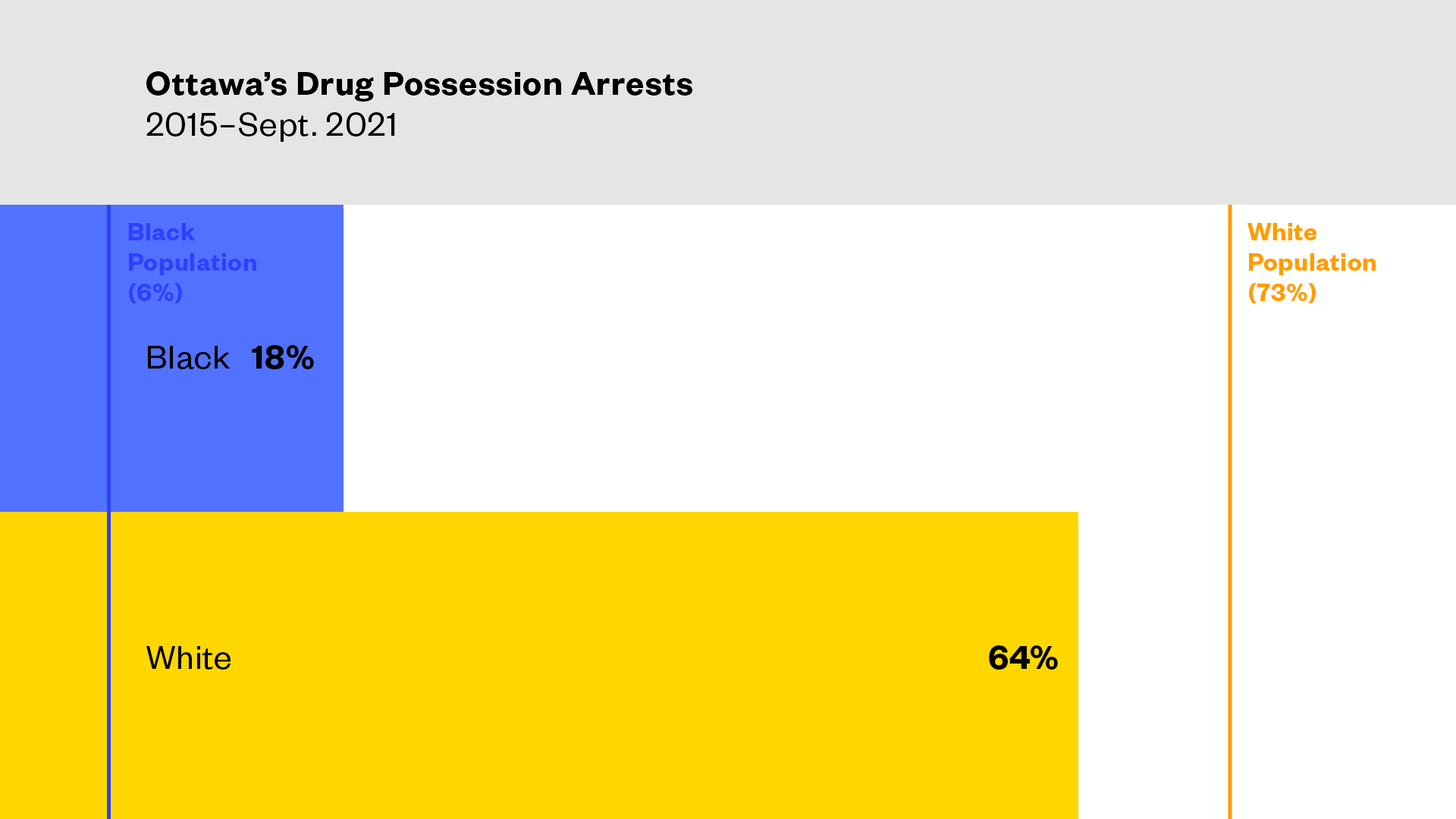
In response to VICE’s 2018 investigation into race-based cannabis arrest data, an Ottawa police spokesperson said at the time the force was making strides to improve racial disparities in its arrests, including through an “anti-racial profiling policy review” and the development of an Equity, Diversity, and Inclusion Officer. These measures do not appear to have made much of an impact on the recent drug possession arrests.
“[W]e recognize the demographic disparities highlighted by the data you have presented,” an Ottawa police spokesperson told VICE World News in an email. “The disproportionate statistics in simple drug possession cases is reflective of the longstanding and still unresolved systemic racism issues in our society.”
The spokesperson pointed out that overall drug possession charges have declined every year since 2015, and added that Ottawa police support the resolution put forward by the Canadian Association of Chiefs of Police in 2020 that called for drug decriminalization.
REGINA AND SASKATOON
Of the cities included in this analysis, Regina and Saskatoon have the starkest racial disparities when it comes to Indigenous people arrested for drug possession by these cities’ police services. The same was true of Regina in VICE’s 2018 cannabis arrest investigation.
In Regina, Saskatchewan’s capital, people classified by Regina police as “Indigenous/Metis” made up 52 percent of the drug possession arrests from 2015 to May 2021. Indigenous people comprise around 9 percent of the city’s population, meaning Indigenous people are nearly six times more likely to be arrested for drug possession than their population rate would predict. White people are significantly underrepresented in this data, making up 48 percent of the possession arrests but around 82 percent of the population.
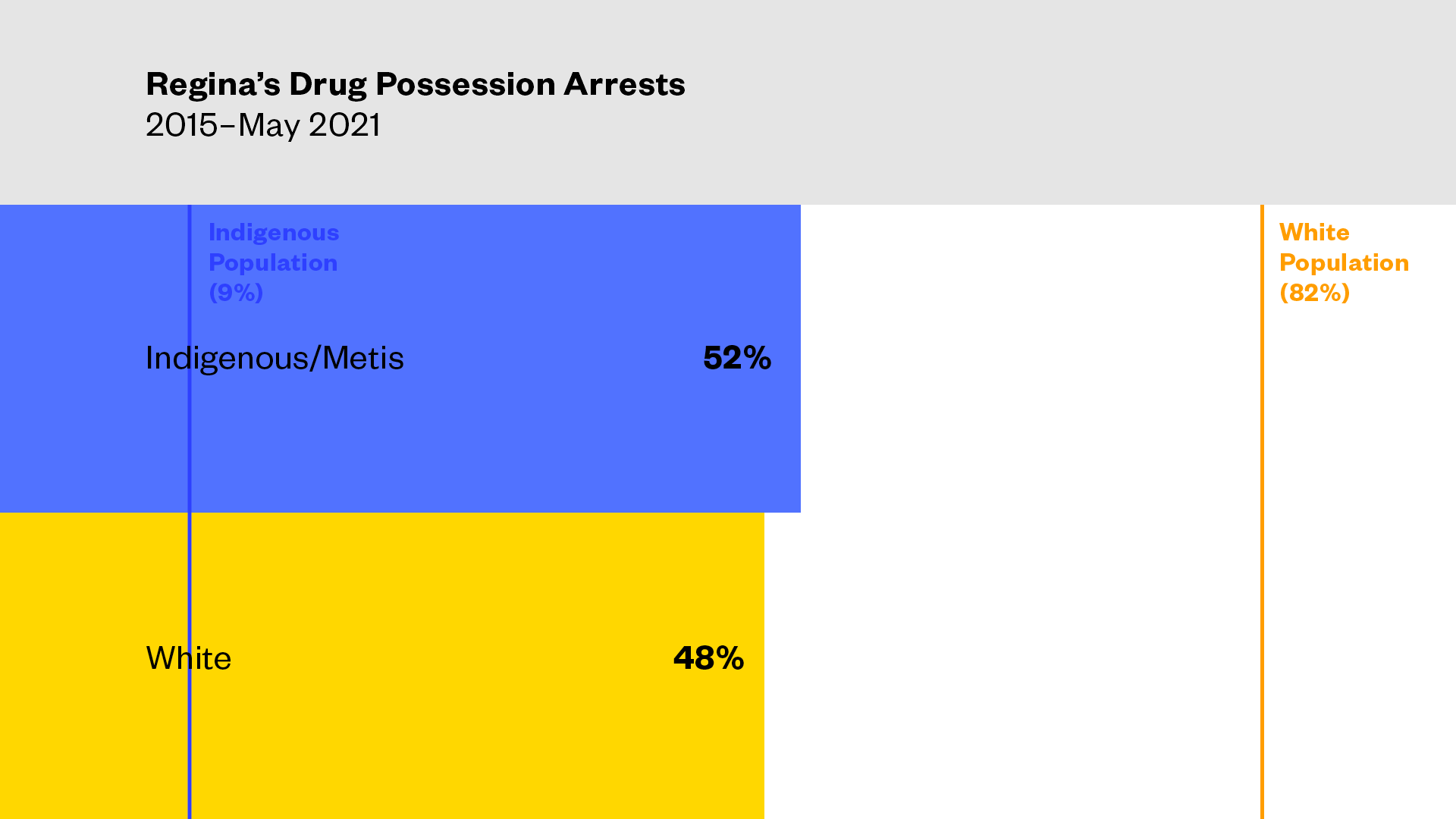
In 2020 and 2019, the two most recent years for which complete data was available, people classified as “Indigenous/Metis” made up 52 percent and 62 percent, respectively, of the possession arrests.
The results are similar for Saskatoon, which is three hours north of Regina. Police arrest data from 2015 to 2020 show that Indigenous people there were around five times more likely to be arrested than their population in the city would predict. Put another way, Indigenous people comprised 53 percent of the possession arrests during those years, despite making up around 11 percent of the population. White people made up 40 percent of the Saskatoon police possession arrests, despite representing around 72 percent of the city’s population.
Elizabeth Popowich, a Regina police spokesperson, wrote to VICE World News in an email that the police service “can’t comment with certainty on the numbers you have gathered through your FOI request” as there “is no way of being certain of the designation of race/ethnicity in these records.” Popowich wrote that race-based data at arrest is based on an individual’s “self-disclosure,” but it could also be based on a police officer’s perception of the person.
Regardless of any issues with the data, Popowich wrote: “You don’t need those numbers to demonstrate what we, in Saskatchewan, have long acknowledged. Indigenous people are overrepresented in the justice system. The actual percentage of Indigenous people in in-custody correctional/prison facilities is many times greater than the percentage of Indigenous persons living in this province.”
“I feel that your premise is that the overrepresentation of Indigenous people in the Justice system is the result of overpolicing racialized communities. It is so much more complicated than that.”
Popowich wrote, “The critical questions are, ‘What’s driving the crime? What’s behind the offending behaviour?’ and asking why these circumstances are more present in our marginalized communities. That’s where the real work lies. Making our communities places of safety, opportunity, and fairness for all is a (very) long-term project to which we are firmly committed.”
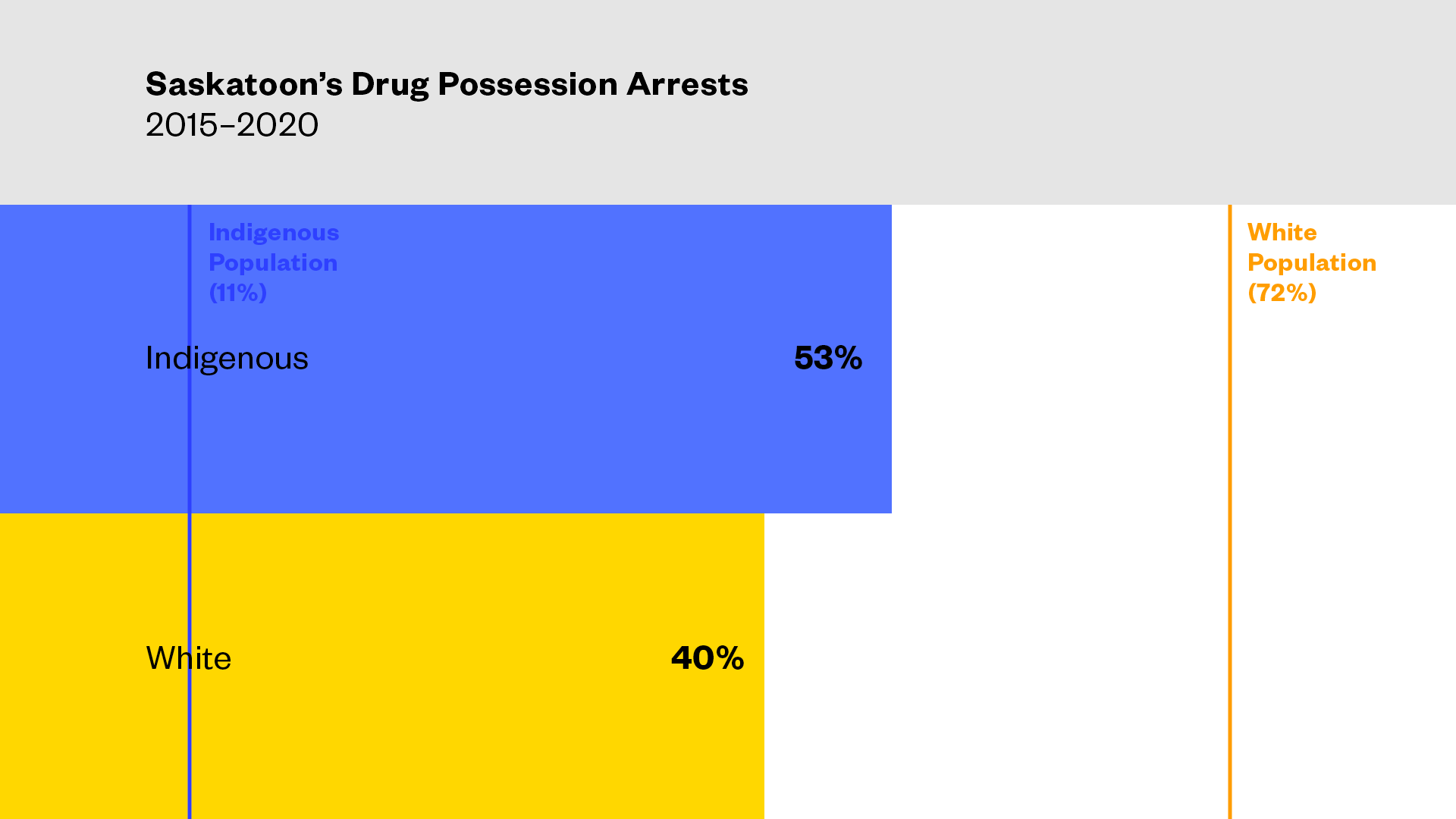
A spokesperson for Saskatoon police told VICE World News in an email the statistics “support the reality that there is an overrepresentation of Indigenous peoples throughout the justice system as a whole.” The spokesperson added that while drug possession charges are often “secondary in nature,” simple drug possession charges are “seldom being prosecuted.” Saskatoon police work with community partners to “seek out alternatives to criminal charges and use of the criminal justice system,” the spokesperson continued.
TORONTO
Black people are nearly four times more likely to be arrested by Toronto police for drug possession compared to their representation in the general population, according to arrest data from 2015 to November 2021. Over those years, Black people made up 30 percent of the drug possession arrests, despite making up under 9 percent of Toronto’s population. White people comprised about 50 percent of the possession arrests for those years, a figure that nearly matches the representation of white people in the city’s population. Other groups, including Indigenous people, were underrepresented in the arrests. (Cannabis arrests, and arrests where race was not marked as officers “did not perceive the subjects [sic] race” were excluded from the data provided by the Toronto police.)
A 2020 report by the Ontario Human Rights Commission based on Toronto Police stats from 2013 to 2017, including drug arrests, provided further evidence that Black people are more likely than white people and other racialized people to be arrested, charged, or subjected to force by the police.
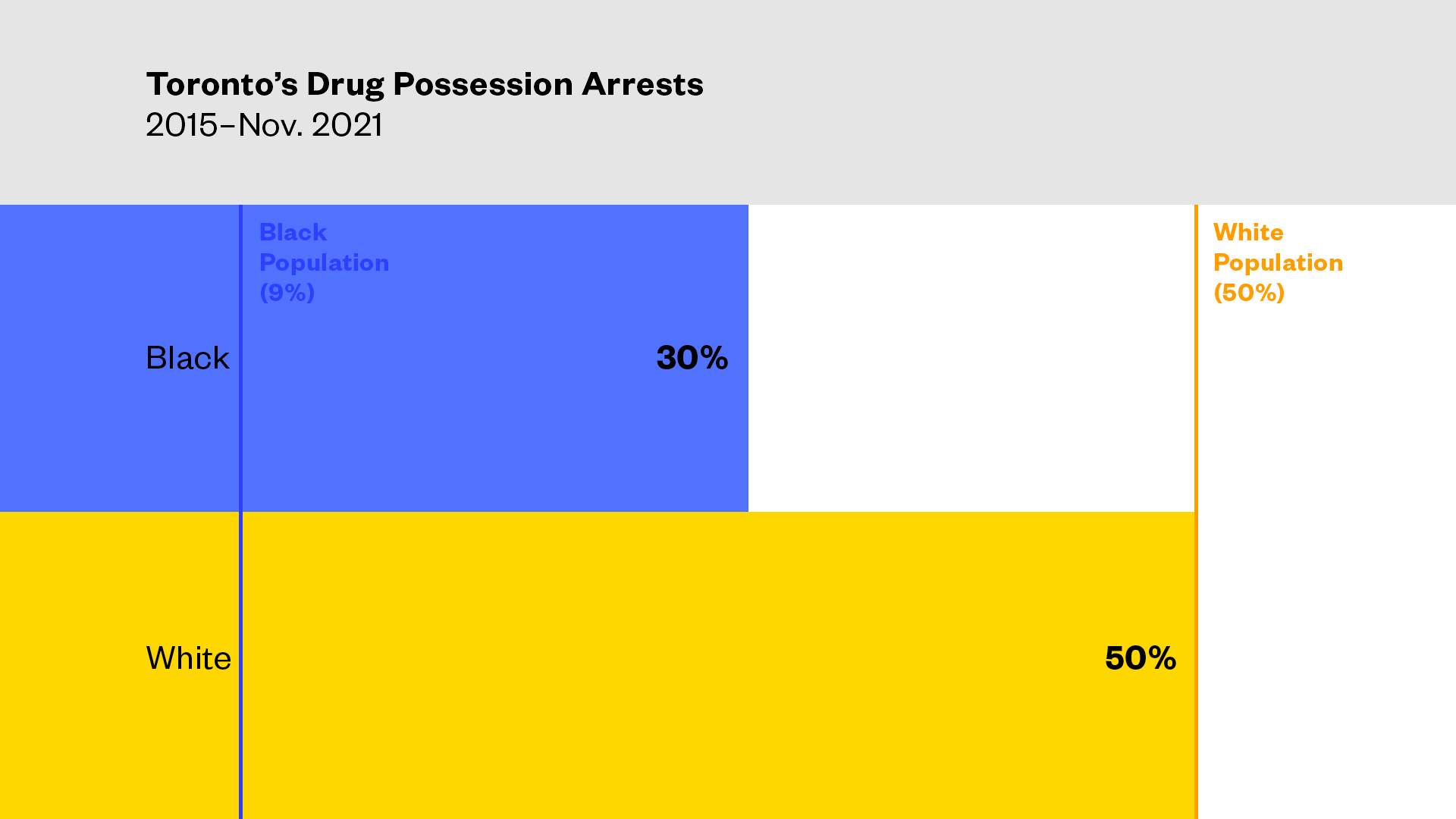
Meaghan Gray, a spokesperson for the Toronto Police Service, told VICE World News in an email that the overrepresentation of racialized people in the criminal justice system is “well documented.” However, Gray contended that comparing arrests for drug possession to the census population of Toronto “oversimplifies a rather complex issue.”
“In order to develop meaningful solutions that go beyond a restating of these findings, we owe it to our communities to look deeper. What drives these disparities? What factors contribute to the overrepresentation in these categories? These are the questions we are working on answering through our Race-Based Data Collection Strategy so we can have actionable insights that lead toward meaningful solutions,” Gray continued. The race-based data collection strategy was launched in 2020 and, according to Toronto police, the data will be used to “identify and to monitor potential systemic racism within the Toronto Police Service” and help “put action plans in place to address any gaps.”
In December, Toronto’s Board of Health voted to request that the federal government allow the city to decriminalize small amounts of illicit drugs as a way to curb the drug poisoning crisis. Toronto police are supportive of this request.
VANCOUVER
While the data shows that overall non-cannabis drug possession arrests by Vancouver police have fallen drastically from 142 in 2015 to 11 in 2020 (and 7 from January to July of 2021), Black and Indigenous people continue to be arrested at disproportionate rates.
From 2015 to July of 2021, Indigenous people made up 19 percent of the possession arrests, despite comprising around 2.5 percent of the city’s population. In other words, Indigenous people are nearly eight times more likely to be arrested for drug possession than their representation in the city’s population would predict.
While Black people represent around 1.2 percent of Vancouver’s population, they made up 6.8 percent of the possession arrests during that time frame. Black people, therefore, are around 6.6 times more likely to be arrested than their representation in the general population would predict.
In 2019, Black people made up around 8.3 percent of the possession arrests, while Indigenous people made up 16.6 percent of the arrests.
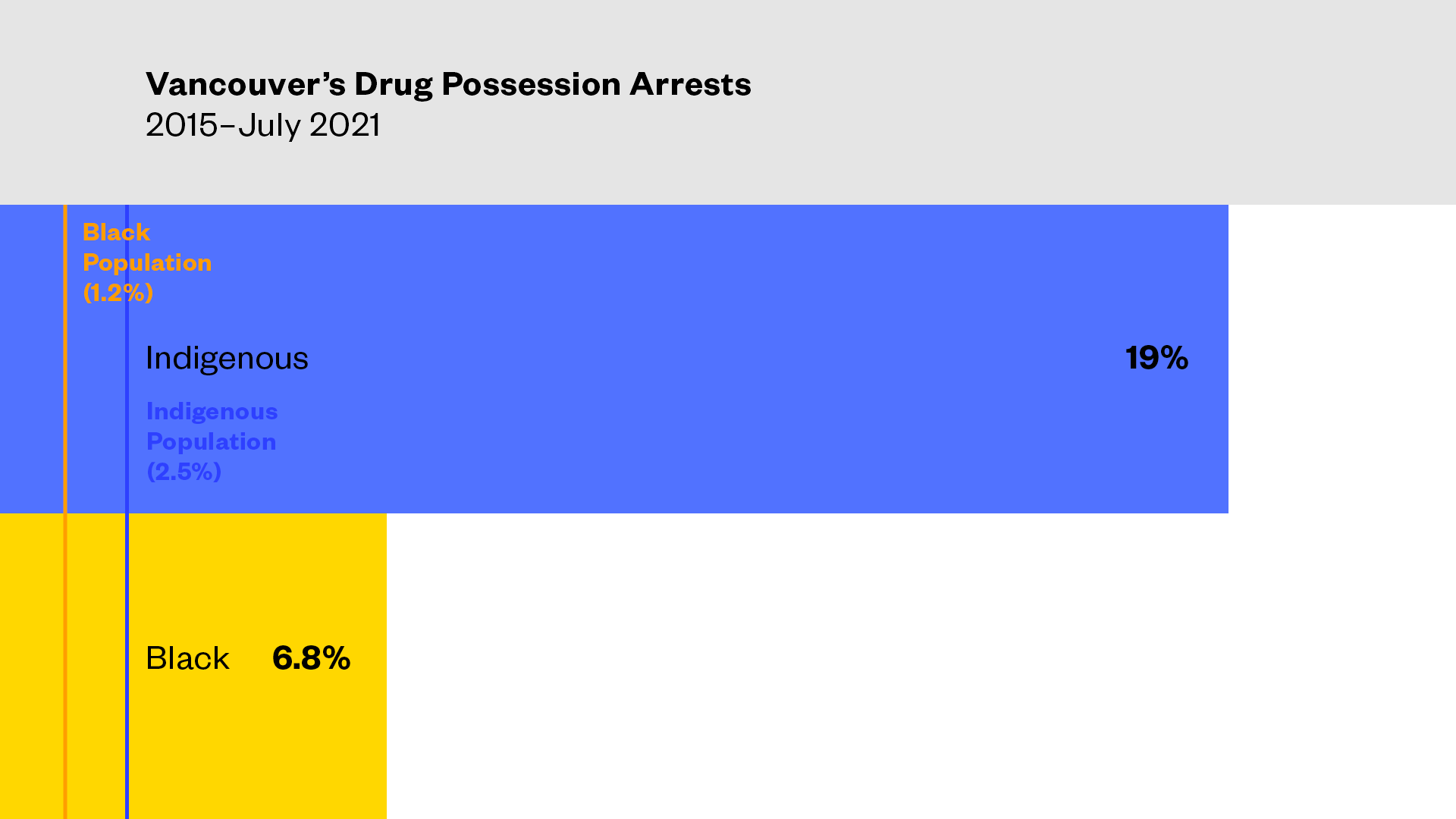
Last year, the Vancouver Sun reported on the racial disparities in drug possession and trafficking charges (distinct from arrests) recommended to prosecutors by Vancouver police from 2014 to 2020 including cannabis. Vancouver police are unique from many other police services in Canada in that they do not decide if someone is charged but instead refer matters to the Crown, which decides. That analysis found that Black people accounted for 6.4 percent of the charges recommended, whereas they represent around 1 percent of Vancouver’s population. Indigenous people faced around 18 percent of the drug charges despite comprising around 2.5 percent of the city’s population.
Vancouver police Sgt. Steve Addison told VICE World News in an email that the police department “recognizes that historical inequities have led to overrepresentation of racialized people in the criminal justice system” and that “implicit and explicit bias [a]ffect decision making for everyone in society.”
Addison added that the department has “ongoing anti-bias training for police officers” and other policies to help officers “identity [sic] and understand their own biases.”
The City of Vancouver and the province of British Columbia have made formal requests to Health Canada to allow for the decriminalization of simple drug possession.